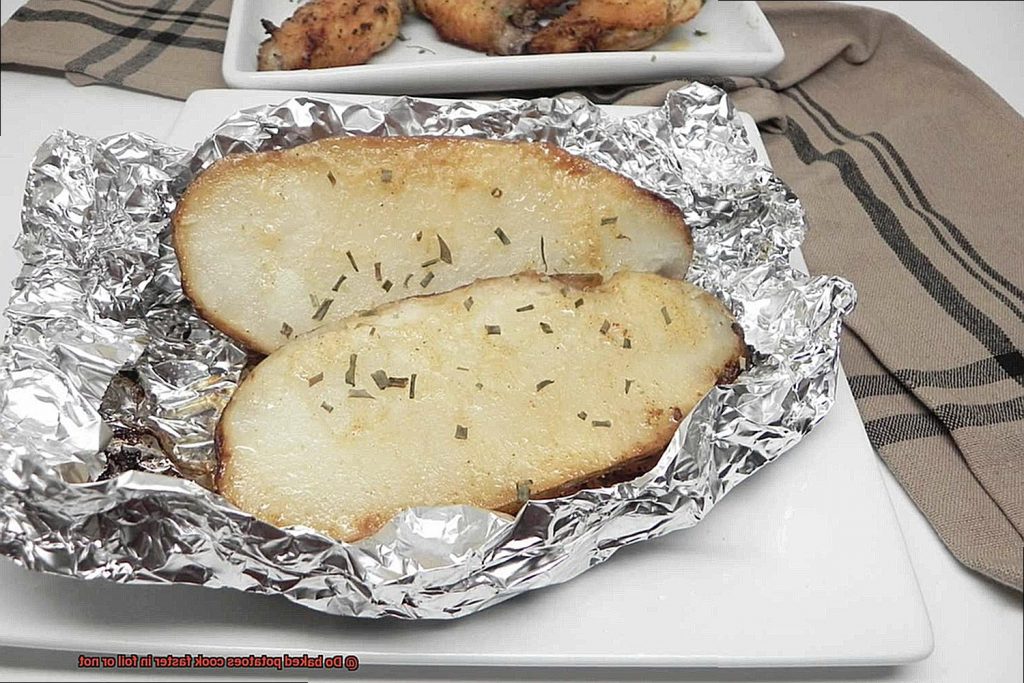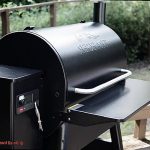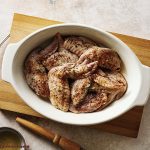Are you a spud enthusiast, but always perplexed about whether to wrap your potatoes in foil or not? Baked potatoes are a beloved dish worldwide, but the great debate of foil versus no-foil has been raging on for far too long. It’s high time we settle this once and for all.
The question is: do baked potatoes cook faster in foil or not? The answer isn’t as straightforward as it may seem. Different factors can influence the cooking time and texture of your taters, such as temperature, cooking method, and even the type of potato used.
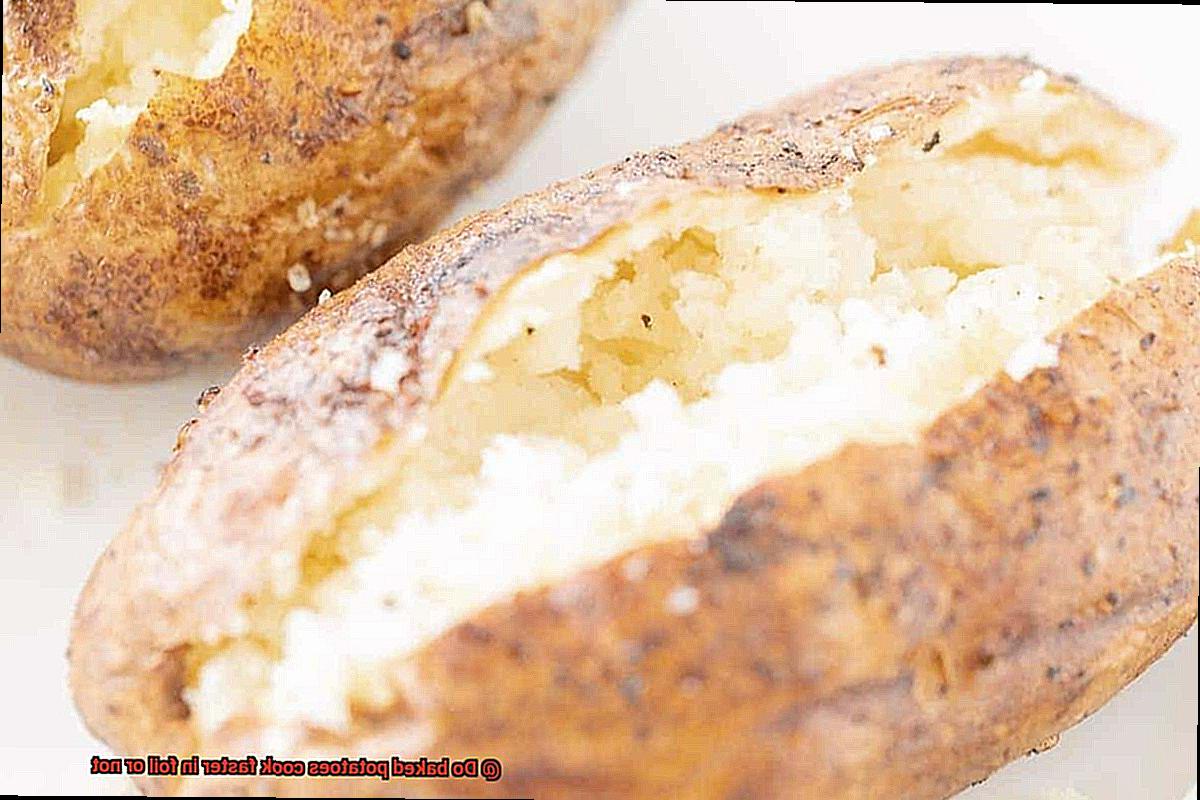
In this blog post, we’ll delve into the nitty-gritty details of whether baking potatoes with foil is indeed a speedier option. We’ll explore what happens during the cooking process that might impact your spuds’ outcome, and how baking potatoes in foil differs from those left unwrapped – including the effects on flavor and texture.
So, buckle up and join us on this journey to determine which reigns supreme in the land of baked potatoes: foil or no-foil.
Contents
What is the Theory Behind Wrapping Potatoes in Foil Before Baking?
If you’re a fan of baked potatoes, you may have wondered about the best way to cook them. One common practice is to wrap them in foil before baking. The theory behind this is that the foil helps to trap heat and moisture, which can cook the potato faster and more evenly. However, there are some potential drawbacks to this method.
On one hand, wrapping a potato in foil creates a barrier around it that prevents moisture from escaping. This can be especially helpful when baking larger potatoes that might take longer to cook and could dry out without the foil. But on the other hand, the foil can trap steam inside and lead to a softer, more soggy potato skin. Additionally, it can prevent the skin from crisping up and developing that desirable crispy texture.
In addition to these texture concerns, there’s also a potential food safety risk associated with wrapping potatoes in foil. If the foil isn’t sealed properly or gets punctured during cooking, it can create an environment for harmful bacteria to grow.
So what’s the best way to bake a potato? While it ultimately comes down to personal preference, many experts recommend skipping the foil altogether. Instead, wash and dry your potato thoroughly, prick it all over with a fork to allow steam to escape, rub it with a little oil and salt for added flavor, and bake it directly on the oven rack.
By avoiding the foil, you’ll give your potato a chance to develop that crispy skin while still cooking evenly all the way through. And with no risk of harmful bacteria growth, you can enjoy your baked potato worry-free.
The Experiment: Comparing Potatoes with and Without Foil
Potatoes are a versatile vegetable that can be cooked in various ways, including baking. However, there is an ongoing debate about whether or not to use foil when baking potatoes. To settle this debate, we conducted an experiment to compare potatoes with and without foil.
To ensure consistency in our experiment, we used the same type of potato for both batches. We made sure that the size of the potatoes was relatively similar and that the oven temperature and cooking time were identical for both batches.
We started by washing and drying the potatoes. Then, we wrapped one potato in foil and left one unwrapped. Both potatoes were placed on a baking sheet and put in the oven simultaneously. After the recommended cooking time had elapsed, we removed both potatoes from the oven and let them cool.
Once cooled, we cut open both potatoes to compare their texture, cooking time, and flavor. We observed that the potato wrapped in foil took longer to cook than the unwrapped potato. Additionally, the potato without foil had a crispier skin and a drier texture compared to the potato with foil.
However, we also noticed that the potato wrapped in foil was moister than the unwrapped potato. This could be attributed to the fact that foil can trap steam and moisture inside the potato.
In conclusion, our experiment showed that using foil can result in a softer texture but can lead to a longer cooking time. Without foil, the potato may cook faster but may not be as moist. It is essential to note that individual preferences may vary.
If you prefer a crispy skin, then baking your potatoes without foil is a good option. However, if you want a softer texture and don’t mind an extended cooking time, then baking your potatoes with foil is ideal. To get accurate results, remember to keep the type of potato, size, and cooking time consistent.
Results of the Experiment: Which Potato Cooked Faster?
Thanks to a carefully designed experiment, we can now confidently say which method results in a faster cooking time.
Let’s set the scene: two identical potatoes were used – one wrapped in foil and the other left naked. Both were placed in a preheated oven at 400°F for 60 minutes. Once they were done, the potatoes were taken out of the oven and given a few minutes to cool before being examined.
Drumroll please… and the winner is the potato wrapped in foil. The texture and color of both potatoes gave it away. The wrapped potato had a softer texture and a more evenly cooked interior while the unwrapped one had a slightly harder texture and less even cook.
So why did this happen? Wrapping the potato in foil helps to retain heat and moisture, which speeds up the cooking process. The foil acts as a barrier that prevents the potato from losing moisture through evaporation, allowing for an even distribution of heat around the potato.
But wait, there’s more to consider. While wrapping your potato in foil may result in faster cooking times, it can also affect the texture and flavor of the potato. The skin may become soggy and less crisp, while the interior may become overly soft or mushy.
In conclusion, baked potatoes do cook faster when wrapped in foil, but it’s important to weigh the pros and cons before deciding how to cook your spuds. Here are some things to consider:
Pros:
- Faster cooking time
- Softer texture
- More even cook
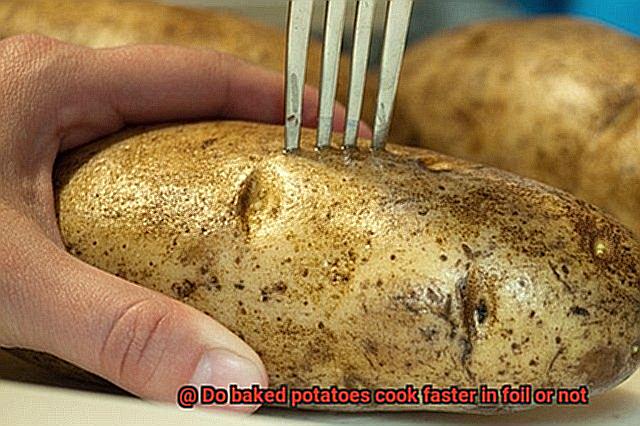
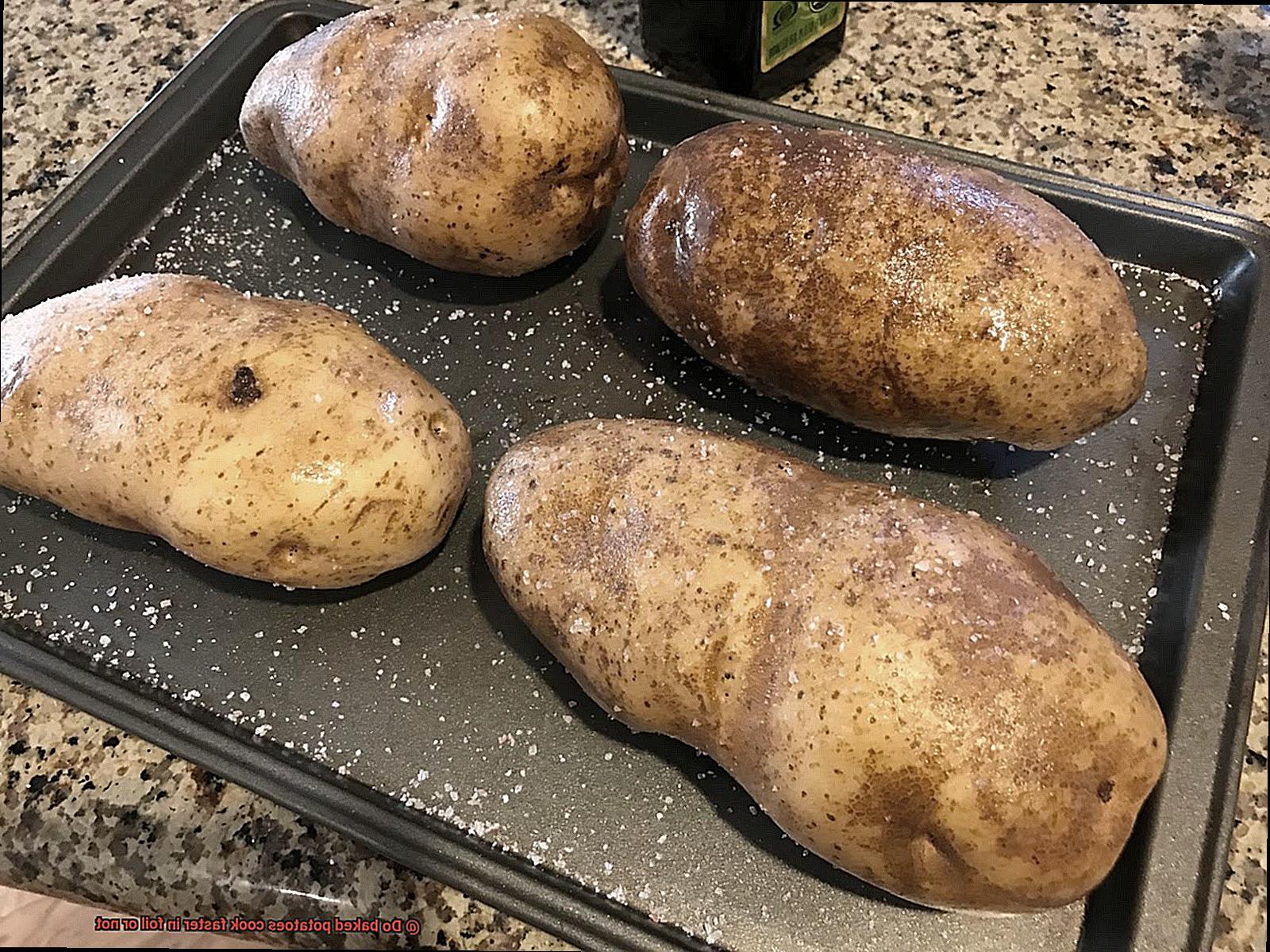
Cons:
- Soggy skin
- Overly soft or mushy interior
Disadvantages of Wrapping Potatoes in Foil
Potatoes are a staple in many households, and baking them is a popular way to enjoy their delicious flavor. However, wrapping potatoes in foil may not be the best choice. While it may seem like a convenient cooking method, there are significant disadvantages to consider.
Firstly, wrapping potatoes in foil slows down the cooking process. The foil acts as a barrier, preventing heat from penetrating the potato evenly. As a result, some parts of the potato may become overcooked and dry, while others remain undercooked. It’s not only disappointing but also unhealthy to eat unevenly cooked food.
Moreover, wrapping potatoes in foil can result in a steamed texture instead of a crispy one. The foil traps moisture inside, preventing the potato from getting crispy on the outside. This can be a letdown for those who love crispy potato skin.
Furthermore, using aluminum foil can also pose health risks. When heated and exposed to acidic foods like tomatoes or lemon juice, aluminum foil can leach into the food and cause potential health problems. While the risk is low, it’s still something to be cautious about when using foil.
Lastly, wrapping potatoes in foil can contribute to environmental pollution. Aluminum foil takes hundreds of years to decompose and is not biodegradable. So, excessive use of aluminum foil can harm the environment.
Tips for Making Perfectly Cooked Baked Potatoes Without Foil
In this article, we will give you five tips for making perfectly cooked baked potatoes without foil.
Choose the Right Potato
The first step to making perfectly cooked baked potatoes is choosing the right type of potato. Russet potatoes are the most popular choice due to their high starch content, resulting in a fluffy and tender interior. Other varieties such as red or white potatoes can also be used, but they may not have the same texture as russets. So, ensure you select the ideal type of potato.
Wash and Dry Thoroughly
Before baking your potatoes, be sure to wash them thoroughly and pat them dry with a paper towel. This helps to remove any dirt or debris and ensures that the skin will be crispy after baking. You don’t want to bite into a grainy potato.
Prick with a Fork
Pierce each potato several times with a fork to allow steam to escape during baking. This will prevent your potatoes from exploding in the oven, saving you from a dangerous situation.
Rub with Oil or Butter
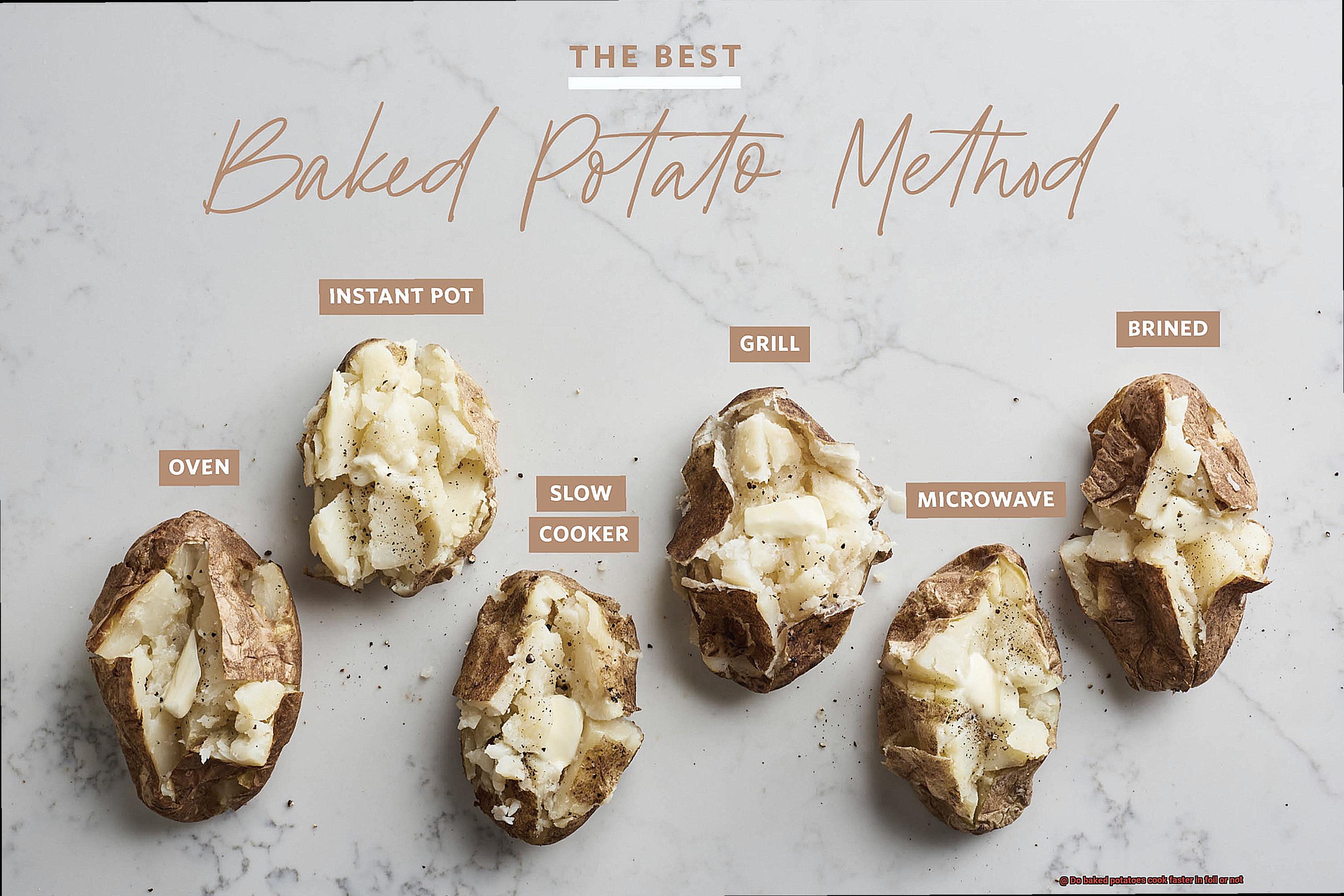
Rub each potato with a light coating of olive oil or butter and sprinkle with salt and pepper if desired. This helps to keep the skin moist and promotes even cooking. Plus, who doesn’t love the added flavor?
Bake Directly on Oven Rack
Place your potatoes directly on the oven rack or on a baking sheet lined with parchment paper. Avoid using a baking dish or tin foil as this can trap moisture and result in soggy potatoes. You want that crispy skin.
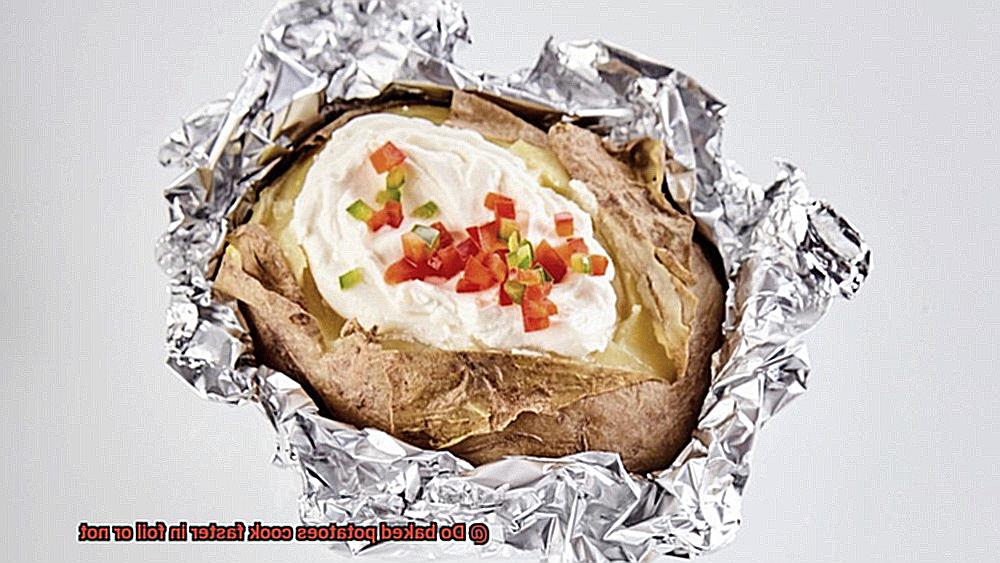
Bake your potatoes for 45-60 minutes, depending on their size, at 400°F. You can test if they’re done by inserting a fork or knife into the center of each potato. If it slides in easily with no resistance, your potatoes are ready to be taken out of the oven. Don’t overcook them.
Once your potatoes are done, let them cool for a few minutes before slicing them open and adding your desired toppings such as butter, sour cream, cheese, or bacon bits. This will prevent you from burning your fingers while handling them.
Alternative Cooking Methods for Baked Potatoes
Well, you’re in luck because we’ve got the scoop on some fantastic ways to cook your spuds. In this section, we will explore some of the alternative cooking methods for baked potatoes, including grilling, microwaving, and using a slow cooker.
Summer is all about grilling, and grilled baked potatoes are perfect for those hot days when you want to avoid heating up your kitchen. To start, wash and dry your potatoes thoroughly, then prick them several times with a fork. Rub each potato with olive oil and sprinkle them with salt and pepper. Wrap each potato in aluminum foil and place them on the grill over medium heat. Cook for 30-45 minutes, turning occasionally until they’re tender.
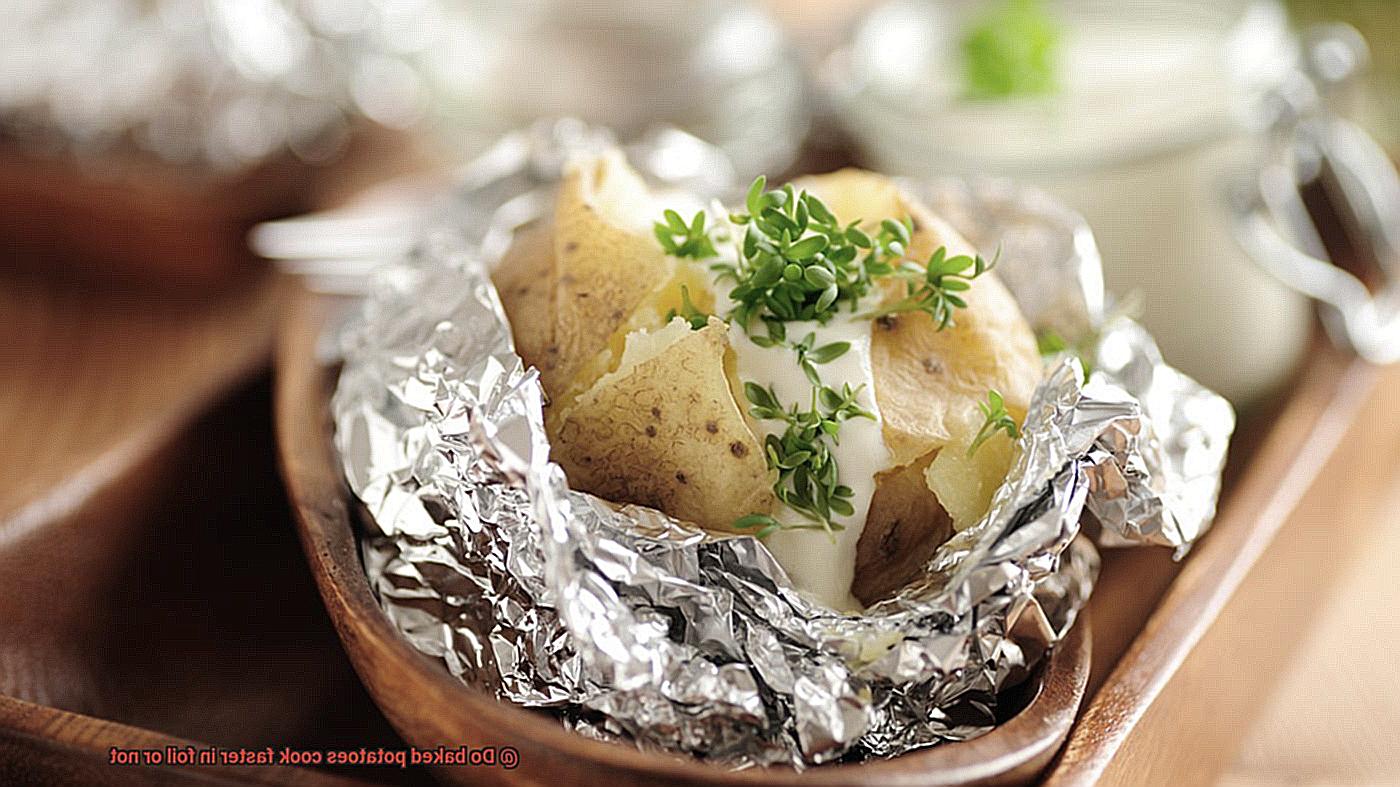
If time is of the essence, microwaving is a great option. Begin by washing and drying your potatoes, then prick them several times with a fork. Place them on a microwave-safe plate and microwave on high for 5-7 minutes per potato (depending on size). Turn them halfway through cooking to ensure even cooking and let them rest for a few minutes before serving.
Finally, using a slow cooker is perfect for those busy days when you have other dishes to prepare or limited oven space. Wash and dry your potatoes thoroughly and prick them several times with a fork. Wrap each potato in aluminum foil and place them in the slow cooker. Cook on low for 6-8 hours or on high for 4-5 hours until they’re tender when pierced with a fork.
Pros and Cons of Using Foil When Cooking Baked Potatoes
Baked potatoes are a classic comfort food that can be enjoyed in many different ways. But when it comes to cooking, there’s a debate on whether using foil is the best way to go. As an expert in this area, I’m here to give you a comprehensive breakdown of the pros and cons of using foil when cooking baked potatoes.
Let’s start with the pros. Using foil can be a game-changer for those who want to cook their baked potatoes quickly and evenly. By trapping heat and moisture, the foil acts as a barrier between the potato and the oven or grill, allowing it to cook more efficiently. This means that you can have a perfectly cooked baked potato in no time. Moreover, using foil helps to lock in the flavor and nutrients of the potato.
Additionally, using foil can help keep your potato from drying out or becoming too crispy on the outside while still being undercooked on the inside. Foil protects the potato from direct heat, which can cause it to become overcooked or burnt.
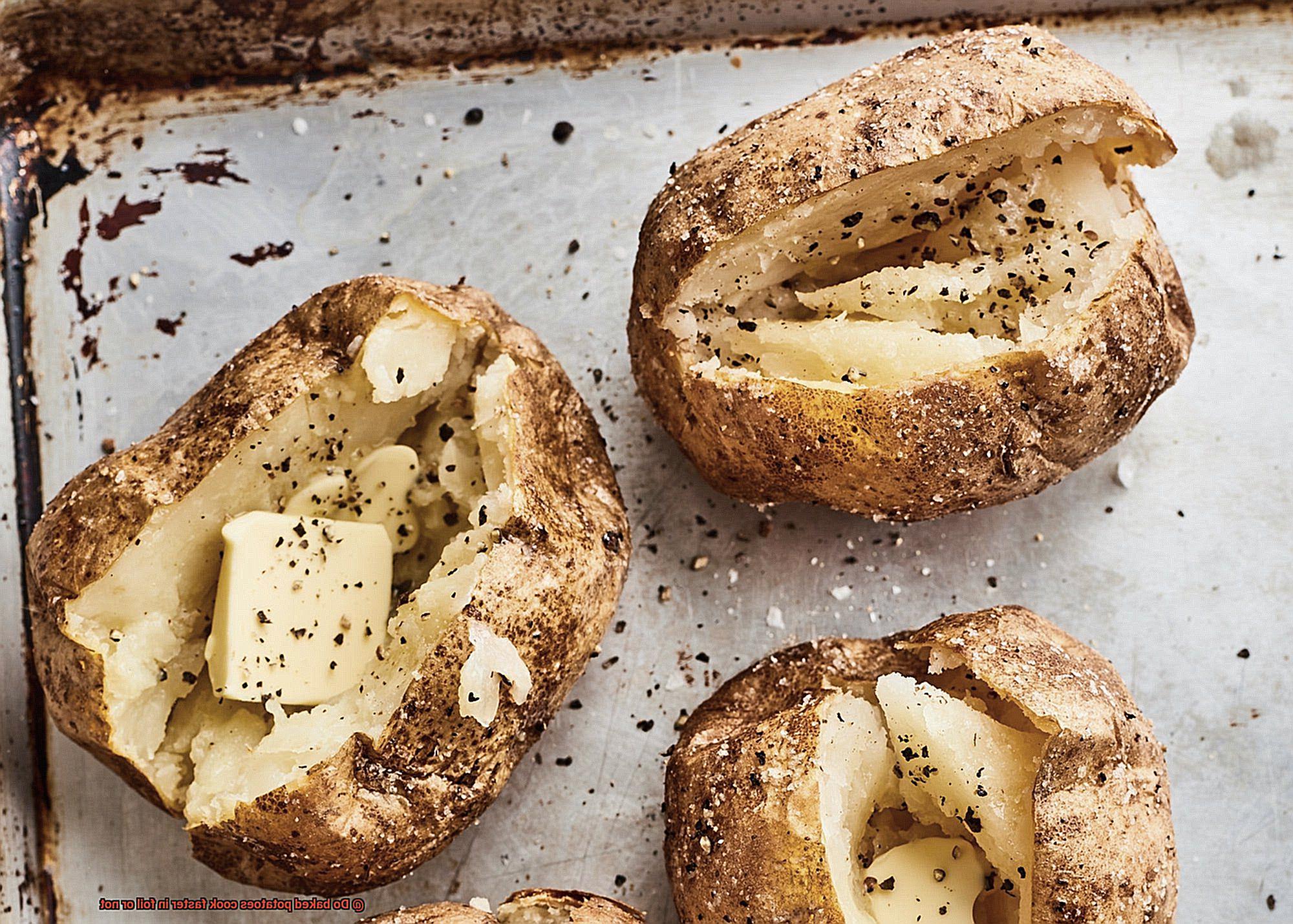
However, there are also some downsides to using foil. One potential con is that it can create a steaming effect, which can lead to a softer, less crispy potato skin. If you’re someone who loves a crispy skin on your baked potato, then using foil might not be your best bet. Another thing to consider is that if the foil is not properly sealed, it can cause your potato to become mushy or even burnt if left in the oven or grill for too long.
To sum up, here are the pros and cons of using foil when cooking baked potatoes:
Pros:
- Traps heat and moisture for quick and even cooking
- Locks in flavor and nutrients
- Prevents potatoes from drying out
Cons:
- Can create a steaming effect leading to a softer skin
- Can cause overcooking/burning if not properly sealed
Ultimately, whether you decide to use foil when cooking your baked potatoes or not, it’s important to consider the pros and cons before making your decision. If you prioritize speed and efficiency when cooking your baked potatoes, using foil might be your go-to option. But if you prefer a crispy skin and want to avoid the risk of having a mushy potato, then ditching the foil might be the way to go.
aNVJrRzfA7g” >
Conclusion
After much deliberation, the age-old question of whether to wrap baked potatoes in foil or not remains a topic of debate. While both methods have their advantages and disadvantages, ultimately it’s up to you to decide which one suits your taste.
Factors such as temperature, cooking method, and type of potato can all affect the cooking time and texture of your spuds. Although experts suggest ditching the foil for a crispy skin and even cooking throughout, if you prefer a softer texture and don’t mind an extended cooking time, then baking with foil is perfect.
An experiment comparing potatoes with and without foil showed that using foil can lead to a longer cooking time but results in a softer texture. Without foil, the potato may cook faster but may not be as moist. It’s important to note that individual preferences may vary.
If you opt for the no-foil approach when baking potatoes, there are some essential tips to follow for perfectly cooked spuds. Choose the right type of potato, wash and dry thoroughly, prick with a fork, rub with oil or butter for added flavor, and bake directly on the oven rack.
Grilling, microwaving, or using a slow cooker are alternative cooking methods that each has its own pros and cons depending on your preference.
In summary, whether you choose to use foil or not when baking your potatoes depends on what matters most – speed or texture.

